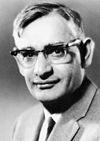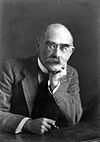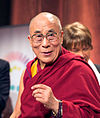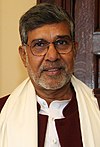List of Indian Nobel laureates

The Nobel Prize is a set of annual international awards bestowed on "those who conferred the greatest benefit on humankind" in the fields of Physics, Chemistry, Physiology or Medicine, Literature, Peace and Economic Sciences,[A][2] instituted by Alfred Nobel's last will, which specified that a part of his fortune be used to create the prizes. Each laureate (recipient) receives a gold medal, a diploma and a sum of money, which is decided annually by the Nobel Foundation.[3] The Royal Swedish Academy of Sciences awards the Nobel Prize in Physics, the Nobel Prize in Chemistry and the Sveriges Riksbank Prize in Economic Sciences in Memory of Alfred Nobel; the Nobel Assembly at the Karolinska Institute awards the Nobel Prize in Physiology or Medicine; the Swedish Academy awards the Nobel Prize in Literature; and the Norwegian Nobel Committee awards the Nobel Peace Prize. They are widely recognised as one of the most prestigious honours awarded in the aforementioned fields.[4]
First instituted in 1901, the Nobel Prize has been awarded to a total of 989 individuals (930 men and 59 women) and 30 organisations as of 2022[update].[5] Among the recipients, 12 are Indians of which 5 are Indian citizens and 7 are of Indian ancestry or residency. Rabindranath Tagore was the first Indian citizen to be awarded and also first Asian to be awarded in 1913. Mother Teresa is the only woman among the list of recipients.[6] Sri Aurobindo, the Indian poet, philosopher, nationalist and developer of Integral yoga, was nominated unsuccessfully for the Nobel Prize in Literature in 1943 and for the Nobel Peace Prize in 1950.[7][8]
On 1 December 1999, the Norwegian Nobel Committee confirmed that Mahatma Gandhi was nominated unsuccessfully for the Peace Prize five times (from 1937 to 1939, in 1947 and a few days before he was assassinated in January 1948).[9] In 2006, Geir Lundestad, the Secretary of Norwegian Nobel Committee, cited it as "the greatest omission in our 106-year history".[10][11][12]
Laureates
[edit]Overseas citizens of Indian origin
[edit]| Year | Laureate | Country of residence | Field | Rationale | Ref. | |
|---|---|---|---|---|---|---|
| 1968 | 
|
Har Gobind Khorana [E] | (born in Raipur,Punjab, British India, now Pakistan) |
Physiology or Medicine | "For their interpretation of the genetic code and its function in protein synthesis." | [15] |
| 1983 | 
|
Subrahmanyan Chandrasekhar | (born in Lahore,Punjab, British India, now Pakistan) |
Physics | "For his theoretical studies of the physical processes of importance to the structure and evolution of the stars." | [16] |
| 2009 | 
|
Venkatraman Ramakrishnan | (born in Chidambaram, India) |
Chemistry | "For studies of the structure and function of the ribosome." | [17] |
| 2019 | 
|
Abhijit Banerjee | (born in Mumbai, India) |
Economics | "For his experimental approach to alleviating Global Poverty" | [18] |
Other
[edit]| Year | Laureate | Country of residence | Field | Rationale | Ref | |
|---|---|---|---|---|---|---|
| 1902 | 
|
Ronald Ross | (born in Almora, British India) |
Physiology or Medicine | "For his work on malaria, by which he has shown how it enters the organism and thereby has laid the foundation for successful research on this disease and methods of combating it." | [19] |
| 1907 | 
|
Rudyard Kipling | (born in Bombay, British India) |
Literature | "In consideration of the power of observation, originality of imagination, virility of ideas and remarkable talent for narration which characterize the creations of this world-famous author." | [20] |
| 1989 | 
|
14th Dalai Lama | (born in Taktser, Republic of China) |
Peace | "For his consistent resistance to the use of violence in his people’s struggle to regain their liberty." | [21][22] |
| 2001 | 
|
V. S. Naipaul | (born in Chaguanas, Trinidad and Tobago) |
Literature | "For having united perceptive narrative and incorruptible scrutiny in works that compel us to see the presence of suppressed histories." | [23] |
See also
[edit]Notes
[edit]- ^ The Sveriges Riksbank Prize in Economic Sciences is an additional prize that was established in 1968 by the Bank of Sweden and was first awarded in 1969. Although not technically a Nobel Prize, it is identified with the award and the winners are announced with the Nobel Prize recipients, and the Prize in Economic Sciences is presented at the Nobel Prize Award Ceremony.[2]
- ^ Per Indian nationality law, Article 9 of the Indian Constitution says that a person who voluntarily acquires citizenship of any other country is no longer an Indian citizen. Also, according to The Passports Act, a person has to surrender his Indian passport; it is a punishable offence under the act if he fails to surrender the passport. Hence, citizenship exclusively includes jus sanguinis (citizenship by right of blood).[14]
- ^ Born in Skopje, Ottoman Empire
- ^ shared with Malala Yousafzai of Pakistan
- ^ Awarded along with Robert W. Holley and Marshall W. Nirenberg
References
[edit]- ^ Kasturi, Charu Sudan (25 August 2013). "Nobel tribute to Tagore – Stockholm to Calcutta, Sweden lines up centenary events". The Telegraph India. Archived from the original on 5 December 2018. Retrieved 4 July 2024.
- ^ a b "Nobel Prizes–Britannica". Encyclopaedia Britannica. Archived from the original on 29 April 2015. Retrieved 4 July 2024.
- ^ "The Nobel Prize". Nobel Foundation. Archived from the original on 15 October 2008. Retrieved 4 July 2024.
- ^ "A short guide to the Nobel Prize". Swedish Institute. 7 December 2018. Archived from the original on 24 January 2019. Retrieved 4 July 2024.
- ^ Media, Nobel (22 November 2018). "Nobel Prize facts". Nobel Foundation. Archived from the original on 6 November 2018. Retrieved 22 November 2018.
- ^ "From 1913 to 2014: Indian Nobel Prize winners". The Hindu. 10 October 2014. Archived from the original on 21 September 2023. Retrieved 14 November 2018.
- ^ Rajinder Singh (September 2012). "Aurobindo Gosh's Nobel nomination". Science and Culture. p. 442. Archived from the original on 8 August 2016. Retrieved 7 November 2018.
- ^ Media, Nobel (22 November 2018). "Aurobindo Ghosh Nomination archive". Nobel Foundation. Archived from the original on 22 November 2018. Retrieved 22 November 2018.
- ^ Levinovitz, Agneta Wallin (2001). The Nobel Prize: The First 100 Years. London: Imperial College Press, London. pp. 181–186. ISBN 9789810246655.
- ^ Tønnesson, Øyvind (1 December 1999). "Mahatma Gandhi, the Missing Laureate". Nobel Foundation. Archived from the original on 2 June 2017. Retrieved 7 November 2018.
- ^ Ghosh, Avijit (17 October 2006). "We missed Mahatma Gandhi". The Times of India. Archived from the original on 23 May 2022. Retrieved 5 December 2018.
- ^ Wolchover, Natalie (10 May 2011). "No Peace for Gandhi". NBCNews. Archived from the original on 7 December 2018. Retrieved 6 December 2018.
- ^ George, P J (10 October 2014). "List of laureates". The Hindu. Archived from the original on 12 November 2017. Retrieved 4 July 2024.
- ^ "Indian Citizenship". indiacode.nic.in. Archived from the original on 5 June 2003. Retrieved 4 July 2024.
- ^ "H. Gobind Khorana". Nobel Foundation. Archived from the original on 1 June 2017. Retrieved 4 July 2024.
- ^ "Subramanyan Chandrasekhar". Nobel Foundation. Archived from the original on 17 June 2017. Retrieved 4 July 2024.
- ^ "Venkatraman Ramakrishnan". Nobel Foundation. Archived from the original on 14 June 2017. Retrieved 4 July 2024.
- ^ "Abhijit Banerjee". Nobel Foundation. Archived from the original on 8 June 2020. Retrieved 4 July 2024.
- ^ "Ronald Ross". Nobel Foundation. Archived from the original on 15 June 2017. Retrieved 4 July 2024.
- ^ "Rudyard Kipling". Nobel Foundation. Archived from the original on 17 June 2017. Retrieved 4 July 2024.
- ^ "Dalai Lama 14th". Nobel Foundation. Archived from the original on 14 April 2015. Retrieved 4 July 2024.
- ^ Aarvik, Egil. "Award ceremony speech". Nobel Foundation. Archived from the original on 27 January 2019. Retrieved 27 January 2019.
- ^ "Nobel Prize in Literature 2001". Nobel Foundation. Archived from the original on 1 February 2016. Retrieved 4 July 2024.







